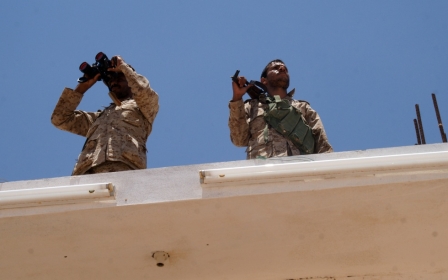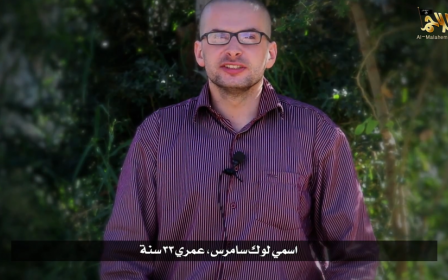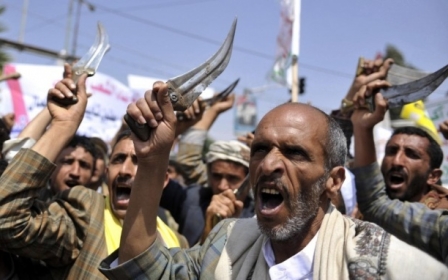Fears for freedom and safety of journalists in Yemen after hostages killed

Many in Yemen were in a state of shock on Saturday, as the dust settled after the killing of two foreign hostages during a joint US-Yemeni raid in Shabwa province.
Former colleagues of the dead men, Luke Somers and Pierre Korkie, joined ordinary Yemenis in pouring out tributes to the lives and work of the pair, who had been held captive by militants from al-Qaeda in the Arabian Peninsula (AQAP) for over a year.
Translation: God bless you Luke Somers. Bless this human being who never killed or wished anyone harm, and who loved our country. Finally al-Qaeda killed him in the name of religion.
The dark day came as Yemen marked the first anniversary of attacks known as the Ardhi Hospital Massacre, when AQAP militants stormed a hospital at a Defence Ministry complex in the capital Sana’a, killing 56 people and injuring more than 150.
CCTV images from the time of the attack show a small child entering a room to attend an appointment – the calm is shattered by a huge explosion from just outside the hospital.
In the aftermath of the bombing, militants wearing military uniforms reportedly went from room to room, shooting people at point-blank range.
A year on from the deadly attack, later claimed by AQAP, Yemen remains rocked by the same militant violence – and reporting it is not getting any easier.
Yemen’s Defence Minister sparked a storm of outrage on Saturday when he reportedly ejected correspondents from al-Jazeera and al-Arabiya from ceremony organised in Sanaa to commemorate those who died in last year’s hospital massacre.
In a country already ranked 167th out of 180 in terms of press freedom according to a worldwide index compiled by Reporters Without Borders, the ever-increasing violence can only add to the challenges of reporting Yemen.
'No guarantee of safety for anyone'
Somers, the British-born American journalist killed in Saturday’s early morning raid, has been praised for attempting to depict the lives of ordinary Yemenis during the years he spent there prior to his capture.
But, says former colleague Sadeq al-Wesabi, his death will heighten fears among journalists that reporting even the realities of everyday life has become too dangerous.
“International journalists are in greater danger of kidnap, but there is no guarantee of safety for anyone.
“Many journalists are prevented by their editors from travelling to war-torn areas to cover the conflict – if high-ranking officials cannot even protect themselves, what can we expect from unarmed people like journalists?”
“There is no way for anyone to protect themselves. I have even heard of journalists visiting conflict areas under protection from armed groups, rather than from the police or the army.
“If you want to report on the aftermath of a drone strike, for instance, this is the only way to do it.”
'New phase of militant attacks' for Yemen
Saturday’s killings raise fears that AQAP could be turning to new tactics as international policies mean that kidnappings are less economically viable.
The United Nations Security Council adopted Resolution 2133 in January 2014, calling on member states to do more to prevent ransoms from being paid to kidnappers.
Farea al-Muslimi, a Yemeni writer and activist, suggests that this resolution could be squeezing AQAP’s income stream, and meaning that the captives, who were taken before the resolution’s adoption, were no longer an important economic tool.
“Yemen is entering a new phase of militant attacks,” according to Muslimi, and the fact that Saturday’s victims were a journalist and a teacher respectively will fuel concerns about the safety of Yemenis and non-Yemenis alike.
“This is a declaration of war, not just against these professions but against everyone – it is an indication of how messy things will be if even reporters and teachers are not spared.”
Getting accurate news is increasingly difficult.
“Newspapers are relying totally on eye-witnesses for reports from conflict areas [because journalists cannot access them]. As a result, Yemeni media outlets are awash with rumours - these rumours simply fuel the fear,” said Wesabi.
The atmosphere is “tense,” says Wesabi, and questions remain about the fate of at least four remaining known foreign hostages, thought to be nationals of Turkey, Saudi Arabia, Iran and Britain.
In the wake of Saturday’s rescue attempt, at least nine AQAP fighters are known to have died.
“I fear that al-Qaeda will take revenge,” said Wesabi.
New MEE newsletter: Jerusalem Dispatch
Sign up to get the latest insights and analysis on Israel-Palestine, alongside Turkey Unpacked and other MEE newsletters
Middle East Eye delivers independent and unrivalled coverage and analysis of the Middle East, North Africa and beyond. To learn more about republishing this content and the associated fees, please fill out this form. More about MEE can be found here.





